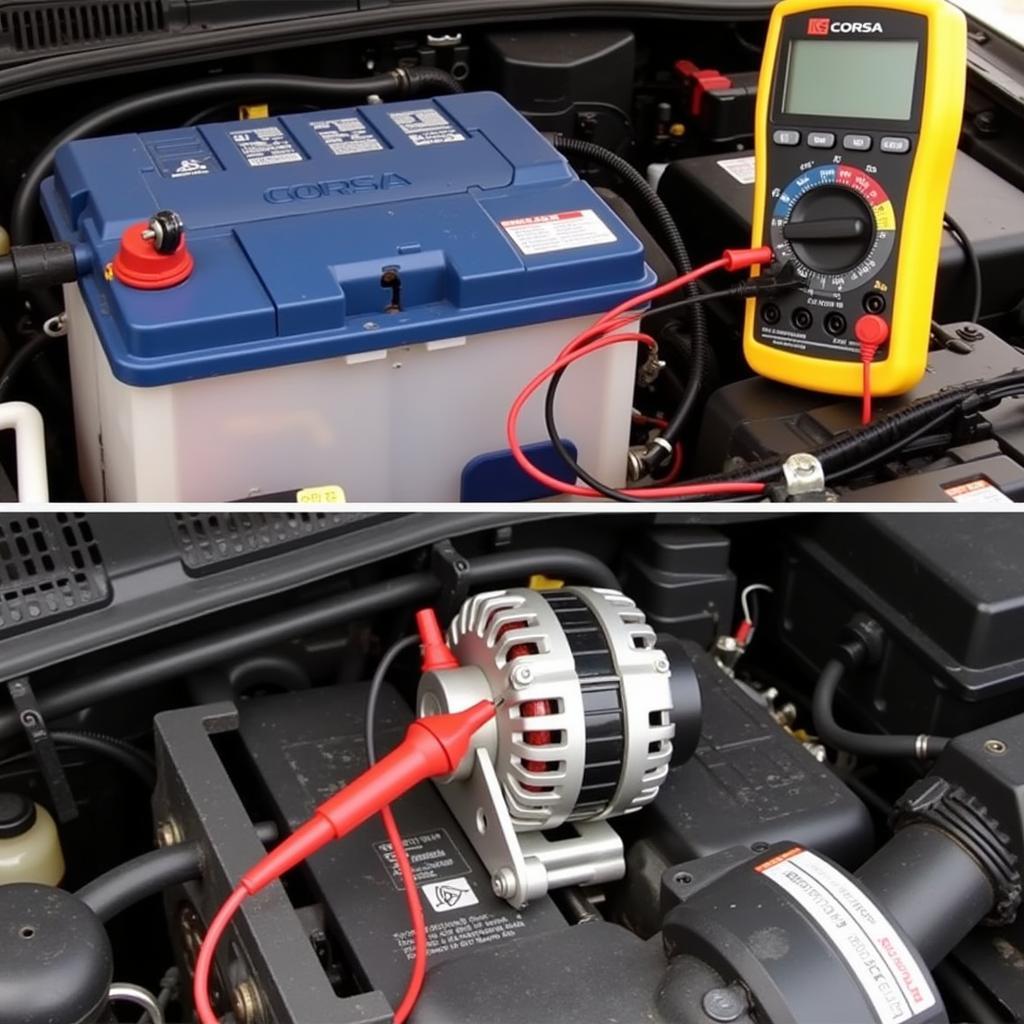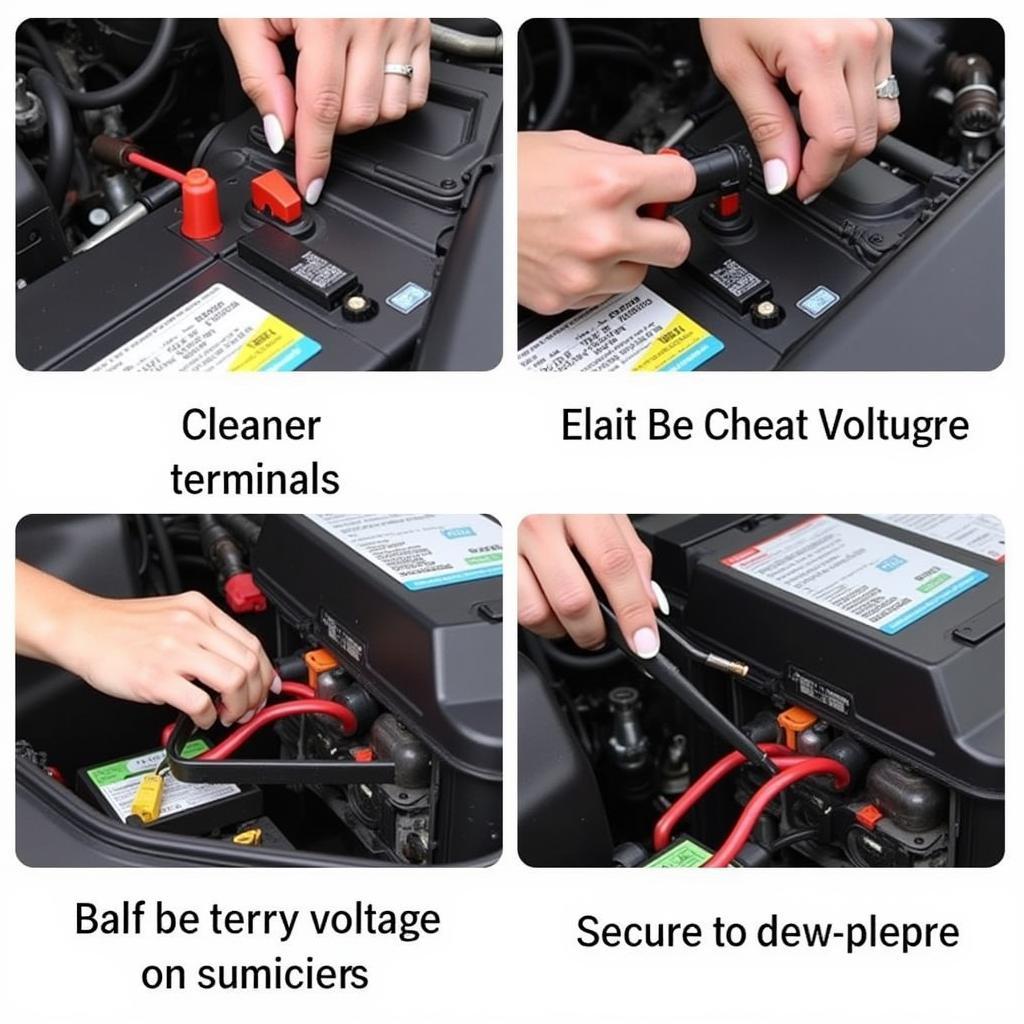Vauxhall Corsa battery problems can be a real headache, leaving you stranded and frustrated. This guide dives deep into the common causes, symptoms, and solutions for Corsa battery issues, empowering you to diagnose and even fix some problems yourself. Whether you’re experiencing a slow crank, flickering lights, or a completely dead battery, we’ve got you covered.
Understanding Your Corsa’s Electrical System
Before tackling specific corsa battery problems, it’s helpful to understand how your car’s electrical system functions. The battery is the heart of this system, providing the initial power to start the engine and supplying power to various electrical components when the engine is off. The alternator takes over once the engine is running, recharging the battery and powering the car’s electrical needs. A malfunction in any part of this system can lead to battery problems.
Common Symptoms of Corsa Battery Problems
Identifying the symptoms is the first step towards diagnosing corsa battery problems. These can include:
- Slow Cranking: The engine cranks slowly or struggles to turn over.
- Dim Headlights: Headlights appear dimmer than usual, especially at idle.
- Flickering Interior Lights: Interior lights may flicker or dim when using other electrical components.
- Clicking Sound When Starting: A rapid clicking sound when turning the key indicates a low battery.
- Warning Lights: Dashboard warning lights, such as the battery light, may illuminate.
- Dead Battery: The car won’t start at all, and the electrical system is unresponsive.
Common Causes of Corsa Battery Problems
Several factors can contribute to corsa battery problems. Some of the most common include:
- Old Age: Batteries have a limited lifespan, typically 3-5 years.
- Extreme Temperatures: Both extreme heat and cold can affect battery performance.
- Parasitic Drain: A parasitic drain occurs when an electrical component continues to draw power even when the car is off, slowly draining the battery.
- Faulty Alternator: A malfunctioning alternator won’t recharge the battery properly, leading to a gradual discharge.
- Loose or Corroded Connections: Poor connections can prevent the battery from charging or delivering power effectively.
- Short Circuits: A short circuit can quickly drain the battery and potentially damage other electrical components.
Diagnosing Corsa Battery Problems
Diagnosing the root cause requires some basic tools and a systematic approach. You can start by checking the battery voltage with a multimeter. A fully charged battery should read around 12.6 volts. A lower reading suggests a discharged battery. You can also test the alternator output to ensure it’s charging correctly.
 Testing Corsa Battery and Alternator
Testing Corsa Battery and Alternator
Solutions for Corsa Battery Problems
Depending on the diagnosis, the solution can range from a simple jump-start to replacing the battery or alternator.
- Jump-Starting: A jump-start can get you going if the battery is simply discharged.
- Battery Replacement: If the battery is old or damaged, replacement is necessary.
- Alternator Repair/Replacement: A faulty alternator needs repair or replacement.
- Addressing Parasitic Drain: Identifying and fixing the source of the parasitic drain is crucial to prevent future battery issues.
- Cleaning Battery Terminals: Cleaning corroded terminals can improve conductivity.
Preventing Corsa Battery Problems
Regular maintenance can help prevent future corsa battery problems. This includes:
- Regular Battery Testing: Get your battery tested every six months, especially during extreme weather conditions.
- Cleaning Battery Terminals: Regularly clean the battery terminals with a wire brush and baking soda solution.
- Minimizing Electrical Load: Turn off unnecessary electrical accessories when the engine is off.
- Properly Securing the Battery: Ensure the battery is securely fastened to prevent vibrations and damage.
“Regular maintenance can significantly extend the life of your battery and prevent unexpected breakdowns,” says John Smith, Lead Automotive Electrical Engineer at AutoTech Solutions. He emphasizes the importance of proactive checks and timely repairs to ensure a reliable electrical system. “Don’t wait until you’re stranded to address battery issues.”
 Corsa Battery Maintenance Tips
Corsa Battery Maintenance Tips
Conclusion
Corsa battery problems, while frustrating, can be effectively diagnosed and resolved with the right knowledge and approach. By understanding the common causes, symptoms, and solutions, you can keep your Corsa running smoothly and avoid unexpected breakdowns. Remember, regular maintenance is key to a healthy battery and a reliable electrical system. Don’t let corsa battery problems leave you stranded – take proactive steps to keep your Corsa powered up and ready to go.
FAQ
- How long does a Corsa battery last? Typically, a Corsa battery lasts between 3 and 5 years, depending on usage and climate conditions.
- Can I replace the Corsa battery myself? Yes, you can replace the battery yourself with basic tools. However, if you’re unsure, consult a mechanic.
- How can I tell if my Corsa alternator is bad? Signs of a bad alternator include dim headlights, flickering lights, and a continuously discharging battery.
- What causes a parasitic drain in a Corsa? A parasitic drain can be caused by faulty wiring, a malfunctioning electrical component, or leaving accessories on when the car is off.
- How much does a new Corsa battery cost? The price of a new Corsa battery varies depending on the type and brand, but generally ranges from £50 to £150.
- How do I jump-start a Corsa? Carefully connect jumper cables to the positive and negative terminals of both batteries, start the working car, and then try starting the Corsa.
- Why is my Corsa battery light on? The battery light indicates a problem with the charging system, which could be a faulty alternator, loose connections, or a bad battery.

